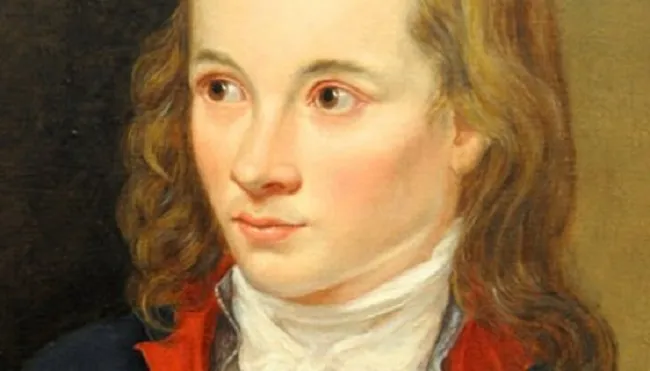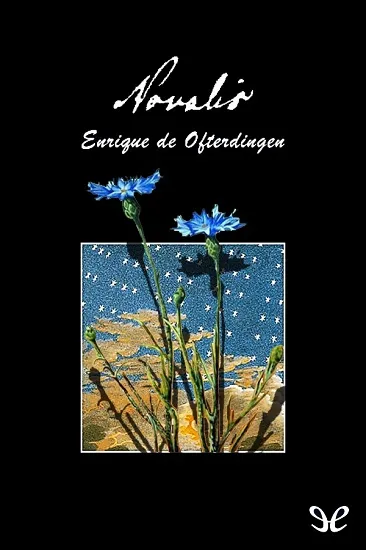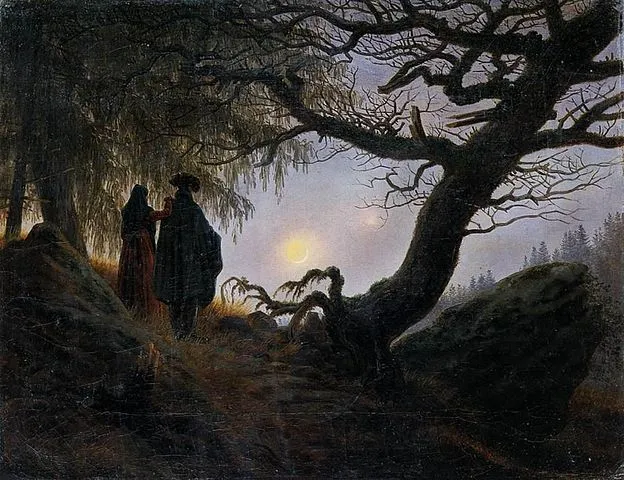El 2 de mayo de 1772 nacía, en Alemania, Novalis, seudónimo de Georg Philipp Friedrich von Hardenberg, quien fuera uno de los fundadores del Romanticismo, el primer movimiento estético de la modernidad y que sentara la bases de esta en la literatura y el arte en general. Sobre la importancia pionera de Novalis y su obra escribí aquí un post, que si desean leerlo pueden ir al siguiente enlace. De modo que en este obviaré cierta información allá contenida.
*
On May 2, 1772 was born in Germany Novalis, pseudonym of Georg Philipp Friedrich von Hardenberg, who was one of the founders of Romanticism, the first aesthetic movement of modernity and that laid the foundations of this in literature and art in general. About the pioneering importance of Novalis and his work I wrote a post here, if you wish to read it you can go to the following link. So in this one I will skip some of the information contained therein.

Las dos obras por excelencia de Novalis son Himnos a la Noche, publicada en 1800, y la novela inconclusa Enrique de Ofterdingen, de 1801. De la primera hablé en el post indicado; en el actual me enfocaré a considerar algunas nociones acerca de la poesía introducidas en la segunda.
Enrique de Ofterdingen consiste en un viaje que hace el personaje Heinrich con su madre a la tierra de sus abuelos; viaje en el que conoce a Mathilde, de quien se enamora, mientras el padre de esta, Klingsohr, lo orienta en su formación como poeta. El impulso (“élan”, como lo nombra Henri Bergson) poético del joven se representará en la imagen de la flor azul, convertida en símbolo arquetípico de la búsqueda de la poesía. En el contacto con la gente sencilla (rasgo muy propio del romanticismo originario): mineros, fabuladores, comerciantes, el joven Heinrich irá realizando su aprendizaje poético acerca del universo, la vida y poesía. Por ello, esta obra es considerada una de las primeras creaciones de ese tipo que se denominará ”novela de formación” (“bildungsroman”). Además, otro rasgo introducido por el romanticismo, estará compuesta de diferentes clases de textos: relatos, sueños, poemas, diálogos, reflexiones filosóficas, etc.
Nos centraremos en algunos fragmentos en los cuales se reflexiona sobre la poesía.
*
The two works par excellence of Novalis are Hymns to the Night, published in 1800, and the unfinished novel Enrich of Ofterdingen, of 1801. Of the former I spoke in the indicated post; in the current one I will focus on considering some notions about poetry present in the latter.
Henry of Ofterdingen consists of a journey that the character Heinrich makes with his mother to the land of his grandparents; a journey in which he meets Mathilde, with whom he falls in love, while her father, Klingsohr, guides him in his training as a poet. The poetic impulse ("élan", as Henri Bergson calls it) of the young man will be represented in the image of the blue flower, converted into an archetypal symbol of the search for poetry. In contact with the simple people (a trait very typical of the original romanticism): miners, fabulators, merchants, the young Heinrich will be making his poetic learning about the universe, life and poetry. Therefore, this work is considered one of the first creations of the type that will be called "training novel " ("bildungsroman"). Moreover, another feature introduced by romanticism, it will be composed of different kinds of texts: stories, dreams, poems, dialogues, philosophical reflections, etc.
We will focus on some fragments in which poetry is reflected upon.

Hablando del poeta y su condición, leemos:
Muy distinto es lo que ocurre a este hombre pacífico e ignorado cuyo mundo es su espíritu, cuya actividad es la contemplación y cuya vida es un silencioso ir modelando las fuerzas de su interior. Ninguna inquietud le lleva a salir de sí mismo. Una tranquila posesión le basta, y el gran espectáculo que se da fuera de su alma no le tienta a participar en él, sino que todo lo que en el exterior ve de significativo y maravilloso le interesa únicamente como objeto de su contemplación. Su anhelo por captar el espíritu que anima este espectáculo es lo que le mantiene a distancia de él, y este espíritu es el que le destinó para este misterioso papel que su alma debe cumplir en este mundo humano.
Para llegar a poseer un lenguaje verdadero y melódico hace falta tener un espíritu amplio, atento y tranquilo. Cuando en el corazón del hombre ruge la tormenta que arrambla con todo y disuelve la atención en un caos de ideas, entonces no es posible el verdadero lenguaje; lo único que de ello puede resultar es una palabrería confusa y enmarañada.
Me atrevería a decir, casi, que en todo poema el caos debe resplandecer a través del velo regular del orden. La riqueza de la invención no se hace inteligible y placentera más que por una disposición sencilla y delicada de las ideas; por el contrario, la mera simetría tiene la sequedad y la aridez de una figura geométrica. La mejor poesía está muy cerca de nosotros, y ocurre muchas veces que un objeto ordinario y corriente sea su materia preferida. Para el poeta la poesía es algo que se encuentra ligado a unos instrumentos limitados, y precisamente el uso de estos instrumentos es lo que la convierte en arte.

Speaking of the poet and his condition, we read:
Very different is what happens to this peaceful and ignored man whose world is his spirit, whose activity is contemplation and whose life is a silent shaping of the forces within him. No restlessness leads him to go out of himself. A quiet possession is enough for him, and the great spectacle outside his soul does not tempt him to participate in it, but all that he sees outside as significant and marvelous interests him only as the object of his contemplation. His longing to grasp the spirit that animates this spectacle is what keeps him at a distance from it, and it is this spirit that destined him for this mysterious role that his soul must fulfill in this human world.
In order to possess a true and melodic language, it is necessary to have a broad, attentive and calm spirit. When in the heart of man roars the storm that sweeps away everything and dissolves the attention in a chaos of ideas, then true language is not possible; the only thing that can result from it is a confused and tangled verbiage.
I would venture to say, almost, that in every poem chaos must shine through the regular veil of order. The richness of invention is only made intelligible and pleasing by a simple and delicate arrangement of ideas; on the contrary, mere symmetry has the dryness and dryness of a geometrical figure. The best poetry is very close to us, and it often happens that an ordinary and commonplace object is its favorite subject. For the poet, poetry is something that is linked to limited instruments, and it is precisely the use of these instruments that makes it art.
***
En estos breves fragmentos se condensa una gran parte de la concepción que Novalis se ha formado (y propone) sobre la condición del poeta y el carácter de su “ministerio”: la poesía. En esa concepción destaca la contemplación, actitud principal del poeta y premisa de la poesía para poder des-cubrir la significación y misterio de las cosas. Para lo cual es indispensable la atención y cierto orden, condiciones indispensables para expresar la complejidad y sencillez del mundo aprehendida a través de la experiencia.
*
These brief fragments condense a large part of the conception that Novalis has formed (and proposes) about the condition of the poet and the character of his "ministry": poetry. In this conception, contemplation stands out, the main attitude of the poet and the premise of poetry in order to be able to dis-cover the meaning and mystery of things. For which attention and certain order are indispensable, indispensable conditions to express the complexity and simplicity of the world apprehended through experience.
Referencias | References:
Novalis (1981). Himnos a la Noche. Enrique de Ofterdingen (Traducción: Eustaquio Barjau). España: Editora Nacional.
https://es.wikipedia.org/wiki/Novalis
https://en.wikipedia.org/wiki/Novalis
Puede acceder a una versión en español de la novela en el siguiente enlace.

Gracias por su lectura | Thank you for reading.
 ?
?


